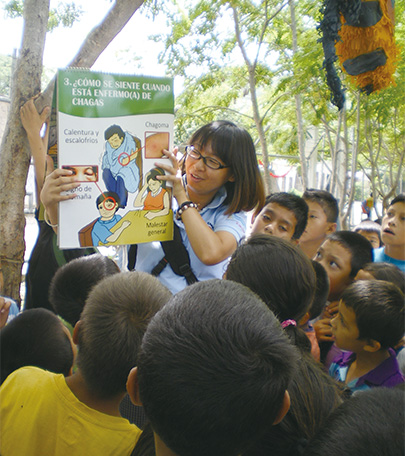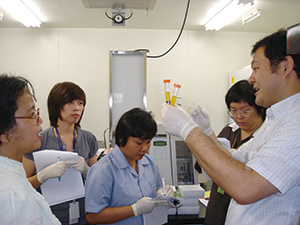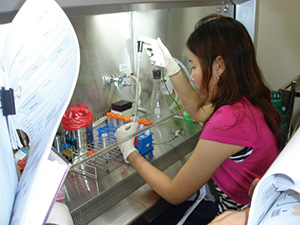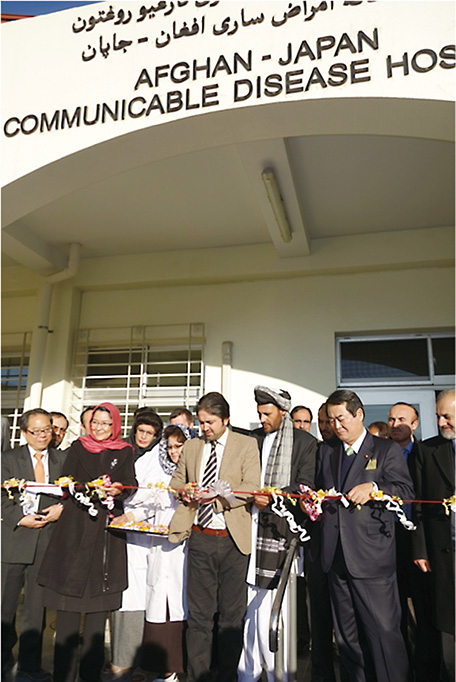(2) Infectious Diseases

A Japan Overseas Cooperation Volunteer, Ms. Aiko Shinomiya, giving a lecture for children on prevention of Chagas disease to promote “Chagas Disease Day” in Nicaragua. (Photo: Aiko Shinomiya)
Infectious diseases such as HIV/AIDS, tuberculosis, and malaria are a serious problem that affects not only the health of individuals, but also the socio-economic development of developing countries. In addition, it is also a significant problem that the severity of threat from these diseases is increasing due to the emergence of such challenges as co-infection of HIV/AIDS and tuberculosis, the emergence of multidrug-resistant and extensively drug-resistant tuberculosis for which conventional drugs are not effective, and other similar conditions. Strengthening measures against new strains of influenza, tuberculosis, malaria, and other emerging and reemerging infectious diseases*, as well as ramping up for the final stage of initiatives to eradicate polio, continue to require international efforts. Furthermore, “neglected tropical diseases”* such as Chagas disease, Filariasis, and Schistosomiasis have infected approximately 1 billion people worldwide(Note 13), causing major socio-economic loss in developing countries. Due to the nature of infectious diseases, the impact of which could spread beyond national borders, the international community must work as one to address these issues. Japan has also engaged in the implementation of countermeasures in close cooperation with the relevant countries and international organizations.
< Japan's Efforts >
| The Three Major Infectious Diseases (HIV/AIDS, Tuberculosis, and Malaria)
Japan attaches great importance to supporting activities to fight the three major infectious diseases (HIV/AIDS, tuberculosis, and malaria) through the Global Fund to Fight AIDS, Tuberculosis and Malaria (the Global Fund). The Global Fund was established as an organization to provide funding to tackle these three major infectious diseases following the discussions on measures against infectious diseases at the G8 Kyushu-Okinawa Summit in 2000 under Japan's presidency. It was the first time that this issue was discussed at a G7/G8 summit meeting. As one of its founders, Japan has provided financial assistance to the Global Fund since its establishment in 2002, and contributed approximately $2.16 billion to the Global Fund by the end of March 2014. It is estimated that support by the Global Fund has saved more than 8.7 million lives. Additionally, Japan provides supplemental bilateral aid through its own program to developing countries receiving aid from the Global Fund, in order to ensure that measures against these three major infectious diseases are implemented effectively in those recipient countries. Japan also strives to strengthen the linkage between the support from the Global Fund and the improvement of health care systems, community empowerment, and the policies for maternal and child health in those countries.
As bilateral assistance for HIV/AIDS countermeasures, Japan is providing assistance to spread knowledge to prevent new infections, raise awareness, widely provide testing and counseling, and enhance the distribution system of drugs to treat HIV/AIDS. In particular, JOCV on HIV/AIDS Control are vigorously engaged in activities such as the spreading of knowledge and understanding of prevention, as well as the care and support of people living with HIV/AIDS, mainly in Africa.
With regard to tuberculosis, Japan's assistance has been focusing on those priority countries needing action, as well as those countries where the spread of the disease is deemed to be serious, as designated and recognized by the WHO. In these countries, Japan has been promoting a series of measures to fight tuberculosis, including in terms of prevention, early detection, diagnosis and continuing treatment, as well as those measures to address co-infection of HIV/AIDS and tuberculosis. In July 2008, the Ministry of Foreign Affairs (MOFA) and the Ministry of Health, Labour and Welfare (MHLW) announced the “Stop TB Japan Action Plan,” which was developed jointly with JICA, the Japan Anti-Tuberculosis Association, and the Stop TB Partnership Japan. Making use of the experience and technology fostered through its domestic tuberculosis countermeasures, and with the public and private sectors working closely together, Japan has strived to contribute to the reduction of the annual number of deaths from tuberculosis in developing countries, particularly in Asia and Africa, setting the target at 10% reduction of the number worldwide (160,000 people, based on 2006 figures). In response to WHO's revised counter-TB plan of 2010, “Global Plan to Stop TB 2011-2015,” Japan also revised its own “Stop TB Japan Action Plan” in 2011 and confirmed that it would continue to work on measures against tuberculosis on a global level under the new international health policies.
With regard to malaria, a major cause of infant mortality, Japan provides assistance for initiatives for anti-malaria measures involving the strengthening of local communities and assistance in cooperation with the United Nations Children's Fund (UNICEF).
| Polio
With regard to polio, which is in the final stages of eradication, Japan works mainly in cooperation with UNICEF to support efforts to eradicate polio with a focus on three polio-endemic countries (countries where polio has never been eradicated and is still spreading), namely Nigeria, Afghanistan and Pakistan. In Pakistan, Japan has provided assistance exceeding a cumulative total of ¥10 billion in coordination with UNICEF since 1996. In addition, in August 2011, Japan partnered with Gates Foundation to provide nearly ¥5 billion of ODA loan. A new approach (Loan Conversion) was adopted for this ODA loan. Under this approach, the Gates Foundation will repay the debt owed by the Pakistani Government if certain targets are achieved. In April 2014, the Gates Foundation began the repayment on behalf of the Pakistani Government, following the confirmation of project outcomes, such as the attainment of high vaccination rate. Furthermore, in FY2013, Japan provided approximately ¥1.19 billion and ¥390 million respectively to Afghanistan and Pakistan, which are recognized as polio-endemic countries. It also provided approximately ¥220 million to Zambia, a non-endemic country. As an emergency measure to counter polio in Somalia, in FY2013, Japan provided ¥110 million to the country.
| Neglected Tropical Diseases (NTDs)
In 1991, Japan took the lead by launching a full-scale effort against Chagas disease, which is also known as a “disease of poverty,” in Central American countries. Japan provided assistance to establish a system for dealing with Chagas disease vectors and contributed to reducing the risk of infection. Regarding Filariasis, Japan supplies antiparasitic agents as well as educational materials to provide knowledge and understanding to a large number of people. Meanwhile, Japan also conducts preventive education through JOCV activities in order to reduce the number of new patients and maintain the non-epidemic status.
Furthermore, in April 2013, Japan launched the Global Health Innovative Technology Fund (GHIT Fund), the first public-private partnership in Japan with the purpose to facilitate the development of new drugs for treatment of infectious diseases in developing countries including NTDs. The GHIT Fund aims to defeat infectious diseases in developing countries through the research and development of low-cost and effective therapeutic medicine, vaccines, and diagnostic products, while promoting global cooperation with research and development institutions both inside and outside of Japan.
| Immunization
Vaccines are a means for combating infectious diseases with proven effectiveness and low cost, and it is estimated that 2 to 3 million lives could be saved each year using vaccination.(Note 14) Since its first contribution in 2011 to Gavi, the Vaccine Alliance*, which was established in 2000 to improve immunization rate in developing countries, Japan has provided a total of approximately $36.17 million to this Vaccine Alliance. Gavi estimates that, in 10 years since its launch in 2000, 296 million children have been immunized with Gavi-supported vaccines and 4 million deaths have been averted. It aims to immunize a further 243 million children from 2011 to 2015, the deadline for achievement of the MDGs, to save 3.9 million lives.
- *Emerging/reemerging infectious diseases
- Emerging diseases: Infectious diseases, which were not previously known but have been newly recognized in recent years, such as SARS (severe acute respiratory syndrome), avian influenza, the Ebola virus, and other infectious diseases.
Reemerging diseases: Infectious diseases that had spread throughout the world in the past, and subsequently saw a decrease in the number of patients and were believed to have been eradicated, but that have been on an increasing trend again in recent years such as cholera, tuberculosis, and other infectious diseases. - *Neglected tropical diseases
- Neglected tropical diseases include such diseases as the Chagas disease, dengue fever, Filariasis, and other diseases that are transmitted from parasites, bacteria, etc. Today, the number of infected individuals has reached approximately 1 billion worldwide, with some cases resulting in death, despite many of these diseases can either be prevented or eradicated. In addition, the fact that the infection of these diseases is particularly prevalent among the poorest segment of the population in affected countries tends to keep the public awareness of this issue relatively low. Therefore, in turn, the development of diagnostic methods, treatment and new drugs, and the process of making them available to those in need, is lagging.
- *Gavi, the Vaccine Alliance
- Gavi, the Vaccine Alliance is a public-private partnership, which was established with the aim to save children's lives and protect people's health by increasing access to immunization in developing countries. In addition to the governments of donor countries and developing countries as well as relevant international organizations, the pharmaceutical industry, private foundations and the civil society are also participating in this partnership.
- Note 13: Source: “Working to overcome the global impact of neglected tropical diseases” (WHO)
http://whqlibdoc.who.int/publications/2010/9789241564090_eng.pdf?ua=1 - Note 14: Source: WHO“ Health topics, Immunization” http://www.who.int/topics/immunization/en
| Thailand
Project for Research and Development of Therapeutic Products against Infectious Diseases, especially Dengue Virus Infection
Science and Technology Research Partnership for Sustainable Development (SATREPS)
(July 2009 – July 2013)

A Japanese researcher giving instructions on research. (Photo: Project Team)

A Thai researcher conducting research on antibodies. (Photo: Project Team)
Southeast Asia, which has a large population, sees frequent outbreaks of reemerging infectious diseases,1 such as dengue fever, influenza, and botulism, and the spread of such diseases across borders poses as a great concern. In particular, dengue fever (dengue virus infection) is an infectious disease that is transmitted by mosquitoes. In tropical regions, 50 million people are infected annually, 250,000 of which develop serious cases. This disease is a serious problem in Thailand, where over 130,000 people developed serious cases in 2013. However, symptomatic treatment, such as bed rest following infection, is the only treatment available for dengue fever. Therapeutic drugs are not yet available for commercial use.
The project aims to produce human-derived antibodies against pathogens that trigger infectious diseases2, which are deemed to be vital in Thailand, through epidemiological studies3. It also aims to contribute to the development of therapies for target diseases. The experts were dispatched from the Research Institute for Microbial Diseases, Osaka University, and carried out the studies with the cooperation of Thai and Japanese researchers.
They had many successes producing human-derived antibodies. By the end of the project, 17 academic papers on the results had been published. One domestic and five foreign applications for intellectual property rights have been submitted. It is essential that the results be used to develop new therapeutic drugs. A pharmaceutical company in India that has shown interest and Osaka University have already started negotiations on future research and development. The research is much anticipated, with the increasing chances of the drugs being made available for commercial use.
*1 See “Glossary”
*2 Influenza virus and botulinum including dengue virus and bird flu.
*3 Scientific research that studies the frequency and distribution of phenomena related to disease contraction and health to find the causes.
| Afghanistan
Tuberculosis Control Project in Afghanistan Phase 2
Technical Cooperation Project (October 2009 – Ongoing)
The Project for Construction of Hospital for Communicable Disease
Grant Aid (February 2011 – October 2013)

Former Parliamentary Vice-Minister for Foreign Affairs Takao Makino (second from right in the front row) cutting the tape at the opening ceremony of the Afghan-Japan Communicable Disease Hospital in January 2014.
Tuberculosis, HIV/AIDS and malaria, which have become global epidemics and have taken the lives of many people, are referred to as the “three major infectious diseases.” Tuberculosis is particularly a serious problem in Afghanistan, which is one of the 22 high-burden countries that have a large number of tuberculosis cases. For this reason, the Government of Afghanistan has been promoting initiatives to combat tuberculosis.
In 2004, Japan started implementing the Tuberculosis Control Project in Afghanistan (Phase 1) and dispatching experts under the project. The project provided support for capacity building in policy making and planning of the Ministry of Public Health, which is implementing tuberculosis measures, and developed a mycobacterium tuberculosis screening system. In 2009, Japan commenced the Tuberculosis Control Project in Afghanistan (Phase 2) in order to continue providing high-quality tuberculosis measures across Afghanistan. In this project, funding from the Global Fund to Fight AIDS, Tuberculosis and Malaria was used for trainings and research related to tuberculosis control projects (tuberculosis screening, awareness-raising activities, and medication) and the purchase of equipment and drugs. Furthermore, with support from the project, tuberculosis measures began to be offered for people who evacuated to other countries and then returned to Afghanistan, ensuring that all people living in Afghanistan can receive high-quality screening and treatment.
Proper treatment of infectious diseases, which are one of the leading causes of death in Afghanistan, in some cases require hospital treatment at an exclusive ward. However, due to inadequate treatment facilities such as hospitals in Afghanistan, the provision of outpatient treatment is often inevitable. This raises concerns over the spread of infection and the epidemic of drug-resistant tuberculosis that cannot be treated with conventional tuberculosis drugs. Accordingly, at the request of the Government of Afghanistan, Japan provided a grant aid for the construction of a hospital exclusively for the treatment of diseases such as tuberculosis, HIV/AIDS, and malaria. In August 2013, the construction of the Afghan-Japan Communicable Disease Hospital that has 80 beds was completed in the capital city, Kabul.
The Afghan-Japan Communicable Disease Hospital is used for the treatment of drug-resistant tuberculosis, which requires hospital treatment compared to other types of tuberculosis, as well as for the treatment of AIDS and malaria patients in critical condition. There are high expectations for the hospital as the first full-fledged hospital for infectious diseases in Afghanistan.
